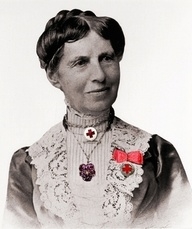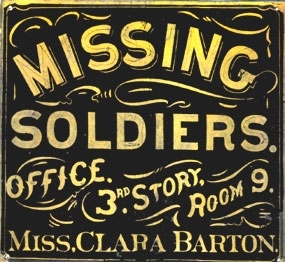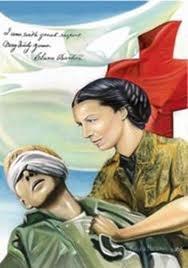 |
| (http://pinterest.com/prizzi/nursing/ ()) |
She sprinted across the battlefield, weaved through the innumerable bodies that littered the ground, and pushed towards the most chaotic area of the battle with but a single purpose: to extend her aid to as many people as possible. Though bullets flew by, she was indifferent about her own safety; as long as she made a difference in at least one person's life, it would all be worth it. The dangers that Clara Barton faced were indescribable. To survive in her endeavors required an immense amount of focus and determination, but she pulled through. She was able to thrive in those conditions due to the strength of her character. Her academic accomplishments started early, as she started her first career as a teacher at the young age of fifteen. At the beginning of the Civil War, Barton began her lifelong passion of giving aid to those in need. She risked her life on a daily basis while delivering supplies to the front lines. After founding the American Red Cross in March 1881, she then continued to spend the rest of her days in service to others, giving relief to those who were caught in a natural disaster or in the midst of a war. Barton stood up for herself and others through her strong will. Although many dissidents voiced their opinions about her work, she persevered through their criticism. Clara Barton demonstrated the characteristics of a true hero throughout her life, not only founding the American Red Cross, but also risking her life on the field of battle, becoming an inspiration to many because of her selflessness, advocacy for equal rights and courage.
 |
| (http://www.nps.gov/anti/historyculture/clarabarton ()) |
Clara Barton selflessly put others before herself, sacrificing her own property and financial security in order to comfort and aid others. After accepting a teaching position in Bordentown, New Jersey, she displayed great qualities that would later make her a controversial figure. "At the time, free public schools were a rarity, and Barton offered to serve three months without pay if the town would make the school free for all the town's children. Overcoming powerful opposition, she personally persuaded the town's leaders to support her experiment" ("Clara Barton 1821-1912"). Giving up three months of her salary was extremely taxing on Barton financially, and yet she chose to go through with it, focused only on the childrens' education. The fact that she personally persuaded the leaders of the town to allow her to enact her experiment further demonstrated how intent she was on bettering the lives of the people around her. The efforts Barton made towards the war further illustrated her selfless, giving nature, and disposition towards giving up her own resources for others. "At first, Barton opened up her own apartment to as many of them as she could and cared for them herself" ("Clara Barton"). She had no legal obligation to open up her home to the soldiers, or any debt she owed that she was paying off. It was her willingness to give up her own living space, so that those less fortunate could have comfort, that drove her actions. In opening up her own living quarters to aid the wounded, Barton gained no tangible benefits. To her, the knowledge that she had helped another was enough. Her inspiration for founding the American Red Cross came from this desire to make a difference. It was therefore not only Barton's ability to help the wounded, but her altruistic personality that encouraged her to put her own needs aside to assist those with greater needs than her own.
Barton advocated for everyone to have equal rights, especially women, both by standing up for herself, and through women's rights and suffrage organizations. Barton did not want to be looked at as inferior to men just because of her gender, but judged by her actions and qualifications instead. "But when opposition to a woman heading so large a school caused the town to appoint a male principal, Barton resigned rather than accept a subordinate role, thus ending her eighteen-year career in education" ("Clara Barton 1821-1912"). Resigning would put her in a difficult financial situation. Knowing that, Barton still valued being treated equally over the salary she would earn from continuing to hold a teaching position. Even though she had built it up over the past 18 years, she went so far as to end her career entirely in order to stand up for herself. She was unwilling to accept a role of less significance than that which she deserved. Barton also chose to participate in organizations that were primarily focused on the promotion of women's rights, often speaking at them, so as to have a more personal take on advocating for her rights. "Miss Barton spoke at rallies and conventions for women's rights. She was involved in several suffrage and women's organizations" ("Clara Barton: The Person"). She was able to further promote her cause with her involvement in organizations that were founded on the same principles of how she believed women should be treated. Speaking publicly, she brought more attention to that matter, giving the cause a better chance of success, therefore supporting her own values. It allowed her to express and confirm her beliefs about equality. In both personal and public ways, Barton stood up for what she believed in throughout her life, furthering the cause of women's rights and suffrage and making a large impact on America and the world.
 |
| (patriotspokenwor?d.?com/?home/?patriotic/?people/? ()) |
Clara Barton exhibited her immense courage on the battlefield, putting her own safety to the side, and only focusing on her patients, even as the war raged on around her, filled with the ghastly, scarring images of the battle. She ventured up to the front lines, where the most action and violence took place, to give her assistance, because that was where the most people in need of help were. That task was a gruesome one, requiring that Barton saw the highest concentration of carnage in the war. "During the remainder of the war she displayed great courage and perseverance in getting supplies to the front. The horrors of battle did not faze her" ("Clara Barton 1821-1912"). Although the conditions of the war were terrible, and it was filled with gruesome things, she was determined to go on, unabated and undeterred from her mission. Considering that she was all the way at the front lines, which was the most chaotic area, it would take an incredible amount of courage and willingness to continue to give all that she could there, while not allowing the battle to disconcert her. Because she valued others' lives far above her own, Barton aided the wounded for as long as she could, insisting that she knew they would be okay before leaving them. "I always tried... to succor the wounded until medical aid and supplies could come up--I could run the risk; it made no difference to anyone if I were shot or taken prisoner" ("Founder Clara Barton"). She clearly was able to see her situation from a greater perspective, because she saw her death or imprisonment as only a minor loss. Her regard for others above herself was most likely what gave her such courage to put her life on the line for the safety of others, and to go at that time and time again. It was her perspective and state of mind that gave her the amazing amount of courage that few people ever possess. Her ability to go into a war zone, knowing the potential costs, and put all her efforts towards assisting others, shows that she undoubtedly possessed the characteristics of a hero.
Clara Barton's life was characterized by her selflessness, as well as her advocacy for equal rights and immense courage, all making her an inspiration to others. Barton dedicated her life to giving help to those in need, and even extended her influence past her death with the founding of the American Red Cross. She personally stood up for her rights, and fought for those not yet given to her. The courage which she displayed both on the battlefield and in all situations she faced was a major part of her character. Clara Barton was undoubtedly a hero, because of the great inspiration that she was and is to many people. She was never swayed by her own personal conditions: "In 1873, Barton came down with rheumatic fever and returned to the United States to convalesce. As she slowly regained her health and considered how she might be of service again..." ("Clara Barton"). Not wanting to waste any time that she could be in the service of others, she did not wait until she was fully recovered from sickness to get back to helping others. While she was out on the field, giving relief to those in need, she gave hope to people who had none. I am personally inspired by her because she went out of her way to help those on the battlefield. I know what it is like to have uncertainty about someone I love, because my dad is in the military. Every day when I wake up, my thoughts are filled with uneasiness and pain, as I wonder whether my dad will live to see the next day. After every phone call, I have no idea if that will be my last time hearing his voice. I am filled with frustration when I think about him, since I know that he can be taken away from me at any time. But when I learned that Clara Barton started an organization to aid people like my dad, I was able to put my worries behind me. It is comforting to know that an organization founded by such a courageous and selfless person is there to help my dad and all others forced into war. Clara Barton was a true hero, devoting her life to rescuing people like my dad. Even though danger often perched so close, eagerly ready to swoop down and grab her, she had complete disregard for her own safety, believing that it was more important to save another's life than to salvage her own.
Works Cited
"Clara Barton." Contemporary Heroes and Heroines. Vol. 2. Gale, 1992. Gale Biography In Context. Web. 10 Dec. 2012.
"Clara Barton: The Person." Virtual Museum Exhibit at Clara Barton National Historic Site. National Park Service, n.d. Web. 10 Dec. 2012.
"Clara (Clarissa Harlowe) Barton." Science and Its Times. Ed. Neil Schlager and Josh Lauer. Vol. 5. Detroit: Gale, 2000. Gale Biography In Context. Web. 11 Dec. 2012.
Page created on 1/10/2013 12:00:00 AM
Last edited 1/10/2013 12:00:00 AM
